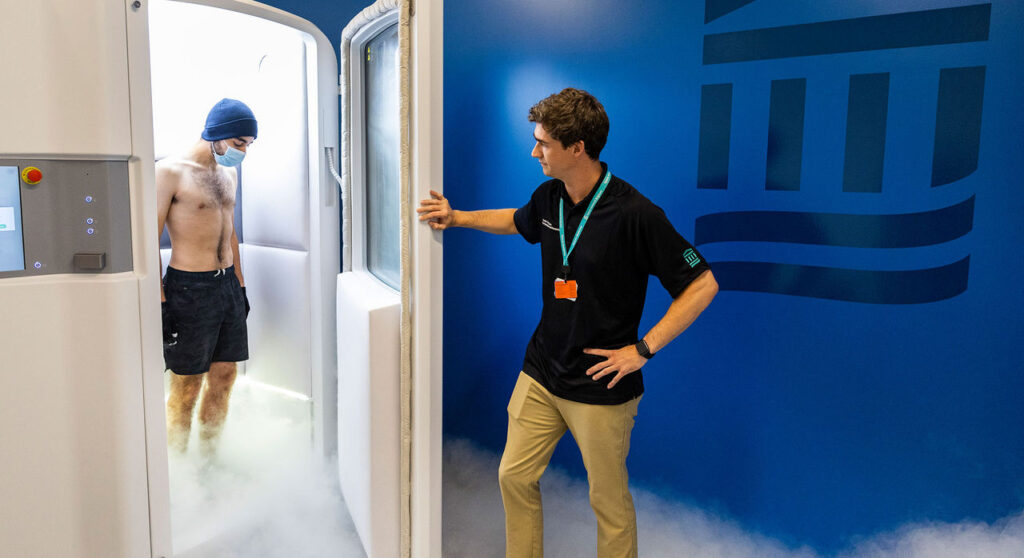This week in the world of sports science, here’s what happened…
- Can short-term exposure to cryotherapy improve athletic performance and sleep quality?
- How fast should young footballers be?
- Do professional rugby players meet their recommended macronutrient guidelines?
Can short-term exposure to cryotherapy improve athletic performance and sleep quality?

A recent study yielded mixed results regarding the use of cryotherapy. The research involved twelve Division I collegiate basketball athletes and employed a crossover, counter-balanced design. Participants were randomly assigned to either a cryotherapy exposure group, which performed post-exercise cryotherapy sessions for five days, or to a control group. The cryotherapy sessions lasted for up to three minutes, with temperatures commencing at −110℃ and gradually decreasing to −196℃.
The results indicated that post-exercise cryotherapy significantly enhanced the number of pull-ups performed by participants. However, no significant improvements were observed in other performance metrics, including the bench press, sprint speed, vertical jump, and agility tests. Furthermore, cryotherapy did not have a significant effect on sleep quality, as measured by both objective and subjective assessments.
These findings suggest that short-term post-exercise cryotherapy offers minimal enhancements to athletic performance and has no observable impact on sleep quality. It is important to note that participants spent on average, only 2 minutes and 8 seconds in the cryotherapy chambers, highlighting exposure time and the study’s limited duration as significant study limitations. Nonetheless, this study contributes to the ongoing debate surrounding the effectiveness of cryotherapy as a recovery tool.
We have an excellent podcast episode featuring Emily Partridge from the Australian Institute of Sport, discussing affordable alternatives to cryotherapy: The Cheap Alternatives To Cryotherapy.

STATSports, a leading provider of GPS player tracking technology, has recently published an insightful Instagram post targeting professionals who work with young footballers. This post outlines the suggested maximum speed targets for aspiring footballers aged 16 to 21.
According to STATSports, the recommended range for individuals in this age group is between 31.82 and 33.23 km/h. The post further specifies target speeds for each age as follows:
- Age 16: 31.82 km/h
- Age 17: 32.33 km/h
- Age 18: 32.76 km/h
- Age 19: 32.94 km/h
- Age 20: 33.12 km/h
- Age 21: 33.23 km/h
While it would be unwise to rely exclusively on these figures, as other factors such as playing style, position, and maturation status must also be taken into account, these targets nonetheless serve as a useful resource for coaches working with footballers in this age range. They provide a valuable benchmark for aspiring elite footballers and their coaches to assess whether their maximum speed is adequate or requires further development.
If you’re a footballer and want to become faster, check out our excellent blog Speed Training In Football (Soccer): How To Develop This Game-Changer and our course Game Speed In Soccer.
Do professional rugby players meet their recommended macronutrient guidelines?

A recent study has highlighted the persistent disparity between research-backed nutritional guidelines and their practical implementation among athletes. The study analysed the dietary habits of 34 professional rugby players from the Italian rugby club Zebre Parma over a span of three days, encompassing a training day, a competition day, and an off day.
The American College of Sports Medicine (ACSM), the International Olympic Committee (IOC), and the International Society of Sports Nutrition (ISSN) have established macronutrient guidelines for rugby players. These guidelines recommend a daily carbohydrate intake of 5.0–8.0 g/kg of body weight and a protein intake of 1.5–2.0 g/kg of body weight while advising that 20-35% of total energy should be derived from dietary fats.
Alarmingly, the findings of the study indicate that 90% of the players did not meet the recommended daily carbohydrate intake, with an average consumption of only 2.7 g/kg of body weight, falling significantly below the established guidelines across all three monitored days. Furthermore, only 50% of the participants met the protein and fat requirements consistently over the three days.
This study illustrates that even at a professional rugby club, players struggle to adhere to the recommended macronutrient guidelines, underscoring the necessity for enhanced education and improved dietary monitoring within the sport. Although the three-day monitoring period presents a limitation to the study, the findings nonetheless serve as a valuable resource for those working in rugby.
From us this week:
>> New course: Foundations of Sports Nutrition
>> New podcast: Secrets of Success: What Makes Teams Thrive?
>> New infographic: Sodium
>> New article: Hydrotherapy
Access to a growing library of sports science courses
SFS Academy is an all-access membership to premium sports science education.
With SFS Academy, you’ll learn from some of the best coaches around the world as they teach you how to apply the latest research and practice with your athletes.






